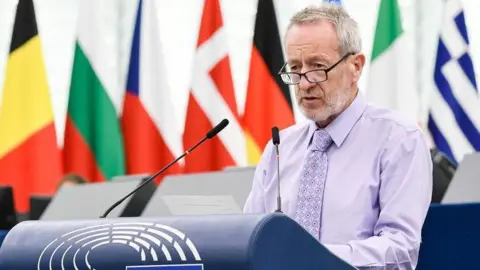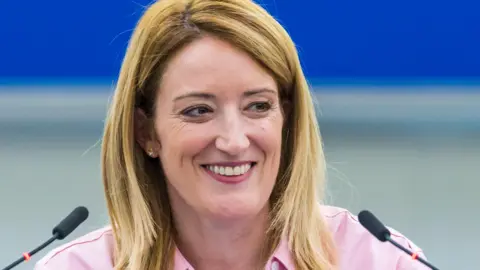Irish language action needed by European Parliament – Kelly

By Robbie Meredith, BBC News NI’s education and arts correspondent
 Fine Gael
Fine Gael“Immediate and sustained action” is needed by the European Parliament to ensure Irish is treated equally to other European languages.
That is according to the Irish MEP – and former president of the GAA – Seán Kelly.
He claimed that Irish speakers in Northern Ireland, who hold Irish passports, can face problems in applying for jobs with the parliament.
He has also called for it to establish a link with Queen’s University Belfast (QUB) in order to recruit more Irish-speaking staff.
Mr Kelly has written to the president of the European Parliament, Roberta Metsola, raising his concerns.
Irish language challenges
Irish was recognised as an official language of the European Union (EU) in 2007.
It is one of 24 official languages in the EU, which means that speeches in the parliament and documents are translated to and from Irish.
But since then a shortage of translation staff has meant that the number of EU documents translated into Irish has been limited.
A European Commission report in 2021 said that EU institutions employed 138 Irish speakers, although over half of the jobs were temporary.
It said that although Irish translation had increased, recruiting enough Irish speaking staff was “the main challenge” to providing full services in Irish.
Mr Kelly is a Fine Gael MEP and an Irish speaker.
In his letter to President Metsola he said that there were still “significant gaps in the provision of Irish language services” which needed “urgent and comprehensive solutions”.
He said that there was still “ambiguity” over whether Irish speakers who live in Northern Ireland, and who hold Irish passports, were eligible to apply for translation jobs in the European Parliament.
Mr Kelly also called for the parliament to establish a Memorandum of Understanding with QUB to enable it to recruit more Irish interpreters and translators.
He said this “could be instrumental in tapping into another significant pool of Irish language talent”.
Experts from Queen’s already authenticate bilingual translations for Belfast City Council, for example.
The EU currently supports a postgraduate course in interpreting at the University of Galway in the Republic of Ireland.
 European Union
European UnionAmong the other measures Mr Kelly has proposed are for school students in Irish-speaking areas to get better careers guidance on working in the European parliament and for “targeted recruitment drives within Gaeltacht regions”.
The Gaeltacht describes parts of Ireland where Irish is the primary spoken language rather than English.
“The parliament’s commitment to multilingualism mandates that all official languages be treated equally,” Mr Kelly’s letter concluded.
“It is imperative that we address the current shortfall in Irish interpretation and translation services with the urgency and dedication it deserves.”
BBC News NI has contacted President Metsola’s press service for a response to Mr Kelly’s letter.
Irish and Ulster-Scots language laws
Separately, new Irish and Ulster-Scots language laws for Northern Ireland were introduced in 2022.
But key elements of that change have not yet come into effect.
An Office of Identity and Cultural Expression has not yet been established.
An Irish language commissioner and a Commissioner “for the Ulster-Scots and the Ulster-British tradition” have not yet been recruited either.
On 10 June, the Deputy First Minister Emma Little-Pengelly told the assembly that recruitment for the posts was “a lengthy process”.
“We are now waiting for more details around the legalities, the contracts, the proposals, the job specs and all those different requirements that we need to look at,” she said.
She said that the Executive Office hoped “to make an announcement in due course” on recruiting eight staff in all for the Office and the commissioner posts.
Related
ForexLive European FX news wrap: Euro stays buoyed, markets wait…
Headlines:Markets:EUR leads, AUD lags on the dayEuropean equities lower; S&P 500 futures up 0.1%US 10-year yields down 2.7 bps to 4.255%Gold up 0.4% to $2,9
European shares fall as tariff uncertainties weigh; US jobs data…
(Reuters) - European shares fell on Friday as frequent shifts in U.S. trade policy throughout the week resulted in risk aversion, while focus remained on th
US economy added 151,000 new jobs in February; Euro on…
US jobs report releasedNEWSFLASH: Hiring across the US economy picked up slightly at the start of Donald Trump’s second term in office.The US economy added 15













